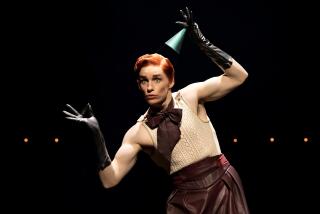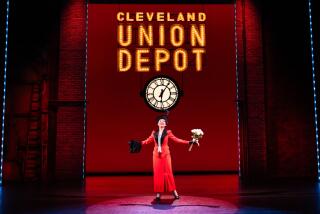Critic’s Notebook: Why are England’s actresses so fantastic?
Reporting from London —
What sets English actresses apart? Is it their dexterity with a turn of phrase, unerring literary poise, or could it be that enviable sang-froid, which comes off as sexy even well into middle age?
These qualities were all in evidence during my recent trip to London, where some of Britain’s finest actresses have turned their attention to the classics this summer. But I made note of another distinguishing attribute after seeing Eve Best in “Much Ado About Nothing” at Shakespeare’s Globe, the American-born Zoë Wanamaker in “The Cherry Orchard” at the National Theatre, Kristin Scott Thomas in “Betrayal” at the Comedy Theatre in the West End, Penelope Wilton and Imelda Staunton in “A Delicate Balance” at the Almeida Theatre and relative newcomer Felicity Jones in “Luise Miller” at the Donmar Warehouse — a willingness to wholly submit to the unique demands of a playwright’s vision.
These performers weren’t trying to seduce us with their star power. In fact, there was nothing self-aggrandizing about their work. It was the style of their particular author, as interpreted by their director, that was their primary concern. Their own cachet appeared to be a distant second.
Is there anything really so distinctive about this, you might ask? Are our actresses, by comparison, such egomaniacal monsters? Hardly, but there is a noticeable difference in orientation. Americans are first and foremost realists, and their training, even when not strictly Method, encourages them to look for their characters within themselves.
There are rewards to this kind of intensive internal examination, but there are also limitations. Beyond homogenizing all writing into a vehicle for self-exploration, an overly psychological approach can put a drag on the production, which begins to revolve around the laggard tempo of an actor’s introspective process.
London offered an alternative more befitting of a concert hall than an analyst’s couch. The gifted actresses I saw treated their plays as scores, and they adjusted their playing as a musician must when switching from Mozart to Bach. The tears that were shed may not have always seemed as moist as they would have on our home stages, but this was a relatively small price to pay for such a large gain in artistic flexibility, which is precisely what performers steeped in a wide-ranging theatrical repertoire need to stay afloat.
On the afternoon I caught Eve Best’s Beatrice in “Much Ado About Nothing” at the outdoor Globe Theatre, it rained through much of the first half of the play. This wasn’t a light mist but a torrential downpour. The galleries and the stage are covered, but the standing area that lies between them is unprotected, and the “groundlings” were getting soaked. Best, as alert as Shakespeare’s sharp-witted heroine, sympathetically took in the plight of the drenched theatergoers without once breaking character.
How did she do it? She registered the inclement weather with a wide-eyed expression of camaraderie that suggested the ironical thought, “Isn’t it something the way life goes?” At one point, she moved to the lip of the stage to feel the wet on her own face. And as the thunder roared, her eye darted heavenward in wry acknowledgement of who’s in charge.
Her handling of the situation was in keeping with Jeremy Herrin’s insouciant staging, which maintained a free and easy accord with the spectators. This was a production that didn’t take itself too seriously yet never lost sight of the play’s deeper shades of meaning. Beatrice herself acknowledges that she “was born to speak all mirth and no matter,” but when accused of being “born in a merry hour,” she answers, “No, sure, my lord, my mother cried; but then there was a star danced, and under that was I born....” A sorrowful shadow fell briefly on Best’s countenance with these lines, hinting at the hidden somber source of her character’s compulsive levity. And just as quickly the lightheartedness returned. This is a woman who would never choose to weep when there was an opportunity to laugh — just don’t mistake her for being frivolous.
Best has found welcome in the States on Broadway (where she’s been nominated for two Tony Awards) and with the Showtime series “Nurse Jackie,” and it’s easy to understand why. This Oxford-educated actress has the British polish that Anglophiles can’t get enough of, but she also has an emotional accessibility. Her crisp diction doesn’t glide over what she’s saying. There’s a heartfelt weight to her words.
“Much Ado,” of course, requires a Benedick who can go toe to toe with Beatrice, and the Globe has found just the right man in Charles Edwards, who like Best can play the clown without being dismissed as one. Their battle of the sexes, pitched somewhere between jollity and bitterness (there’s no question that these two have romantic history), captures both the light and dark sides of Shakespeare’s ever-sparkling comedy.
The casting of Zoë Wanamaker in “The Cherry Orchard” initially seemed to me enticingly counterintuitive. She’s so commanding a presence that it was hard to see how she would handle the vainly dithering, self-defeating antics of Ranyevskaya, who has returned from Paris after a disastrous love affair to find her family estate besieged with debts.
But Wanamaker proved to be the perfect fit for Howard Davies’ political-minded production, which sees the class struggle at the heart of Chekhov’s play as a tumultuous though not unhealthy development. As Conleth Hill’s Lopakhin seizes the opportunity to buy the property his ancestors toiled on as serfs, Wanamaker’s Ranyevskaya, realizing this chapter of her life is over, goes through the motions of her grief. She confronts loss, but this is no tragedy. Her future lies elsewhere — possibly in Paris for a time with her ailing wastrel lover, possibly back in Russia to watch her daughter Anya carve an independent path out of the ruins of their once glorious and utterly indefensible aristocracy.
Ranyevskaya’s grief is self-dramatizing here, but that doesn’t make it a lie. Wanamaker, following the lead of Davies’ direction and Andrew Upton’s somewhat tendentious adaptation, simply allows her character to intuit the bigger picture. Life is hard, and Ranyevskaya is ill-equipped for hardship, but she’s a survivor, and somewhere inside her she knows that to cling to the past is a form of living death. This interpretation may be confining, but Wanamaker inhabits it with a robust flair that feels within the parameters set by this production completely Chekhovian.
The enigmatic Kristin Scott Thomas lends her feline grace to Ian Rickson’s revival of Harold Pinter’s “Betrayal” at the Comedy Theatre, and although it’s not a flashy performance by any means, it should make her a highly sought-after Pinter interpreter. Pauses, those resonant craters that routinely interrupt the playwright’s dialogue, come as naturally to her as breath.
Scott Thomas is a master of discretion. There’s no need for her to swan around in the spotlight. Our eyes are glued to her every movement. The audience watches her Emma the same way Douglas Henshall’s Jerry (her lover) and Ben Miles’ Robert (her husband) watch her — looking for the signs that will reveal the truth of her affections.
The setup of “Betrayal,” twisting back in time from the end of an adulterous affair to its beginning, doesn’t leave an actor a lot of warm-up room. To make matters more difficult, there’s more subtext than text. Scott Thomas answers these challenges with a surgical acting style that exposes more than it articulates — while slyly suggesting, in that consummately Pinteresque fashion, the validity of the opposite emotion.
All hail Penelope Wilton and Imelda Staunton, who treat the stilted verbal arias of Edward Albee’s “A Delicate Balance” as though they were the most logical form of communication possible in this wealthy WASP redoubt. Wilton, who plays Agnes, the all-controlling matriarch, and Staunton, who plays her unmarried alcoholic sister, Claire, handle their portion of the language banquet in ways that are strictly appropriate to their bickering characters.
Agnes has stopped asking questions she can no longer answer. It’s not that her perceptions have dulled, but at this late stage of the marital and parental game, she sees no point in thawing out emotions that have been frozen for years. She thus speaks with an intimidating authority that Wilton convinces us, without softening a syllable, isn’t from a lack of sensitivity but an excess of it.
Claire, the sniping truth-teller, drinks because she is unable to cut off parts of herself the way her sister has. She has to anesthetize her misery instead. Staunton makes every utterance of Claire’s a roiling effort — one that is evidently preferable to the suffocation of silence, if just barely.
The production, directed by James Macdonald, is never at a loss for acrimonious words — or the scared, angry eloquence conjuring them up. It’s a long play, and it wears its existential dread like some retro wear from the mid-1960s era from which this Pulitzer Prize-winning work sprang. But with Wilton and Staunton leading a magisterial cast, this tale of a family under siege from outside and within sings in the distinctive tones that have made Albee an American original.
Finally, there’s time to leave you with the name of an actress who has a luminous future ahead of her —Felicity Jones, who plays the title role of “Luise Miller” at the Donmar Warehouse. She has beauty and charm to spare, but what struck me about her performance in this adaptation of Friedrich Schiller’s late 18th century domestic tragedy by Mike Poulton is her ability to embody the manifold contradictions at the heart of the drama. Innocence blends with stubbornness, otherworldliness with provincialism, purity with fanaticism. Suffice it to say that she’s a significant reason Michael Grandage’s production of this play, which could so easily seem creaky, lives as dynamically as it does.
Indeed, all these superb actresses are part of the great revival act that has transformed London this summer into a playground of the theatrical past. But then temporal distinctions are superfluous when you have performers able to inhabit theatrical worlds with such bracing immediacy.
More to Read
The biggest entertainment stories
Get our big stories about Hollywood, film, television, music, arts, culture and more right in your inbox as soon as they publish.
You may occasionally receive promotional content from the Los Angeles Times.







